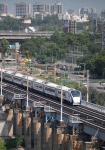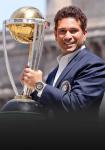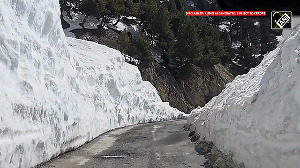A solid political relationship with France could balance India's foreign relations, which have often tilted towards the US or Russia, feels Claude Arpi.
France has a new President.
With nearly 52 per cent of the vote, Francois Hollande defeated Nicolas Sarkozy, the 'hyper' outgoing president.
The turning point of the campaign was the television debate between the two candidates of the final round: Nicolas Sarkozy and Francois Hollande, the Socialist candidate. It was watched by more than 19 million people in France (of a population of 63 million and 46 million voters).
During the three-hour debate, a jumpy Sarkozy, with his usual tics and body movements, called Hollande a 'liar' several times; then, Hollande used what the Americans call a 'zinger' (a killer argument).
He started a long tirade (more than three minutes; each second of the debater being rigorously counted) in a regal tone (or, more correctly a presidential, voice): 'Moi, President de la Republique, je... (I, President of the Republic, I...).'
He repeated the zinger 16 times: 'I will do this , I will not do this...' taking examples of actions, decisions or declarations when Sarkozy had obviously been wrong (for example, interfering in the judicial system or not being above petty politics).
That was it.
The most surprising part, perhaps, was that Sarkozy did not interrupt Hollande; he listened silently. It was as if he was at the end of a very long journey during which he had relentlessly spent his energies 'to save France' from a fate similar to Greece.
Many in India ask the question: Will Francois Hollande's election as president of the French Republic change Indo-French relations?
The answer is, probably not much.
One of the main characteristics of this presidential campaign was the total lack of interest in foreign affairs. Both candidates are not too apart as far as France's foreign relations are concerned.
Take Afghanistan: Both Hollande and Sarkozy agreed to withdraw the French troops. The difference was just a question of timing -- Hollande promised the departure of French forces before the end of the year, while Sarkozy would have preferred to wait one more year.
There are also some divergences on the integration of the French army in NATO; the main difference remains Paris's position vis-a-vis Berlin. Some adjustment will have to be made by both 'partners' if the French-German 'couple' is to continue to give a lead to Europe.
What about France's relations with India?
The word 'India' did not appeared a single time during the entire campaign.
But, to understand Hollande's probable position, it is worth quoting an article published in the French newspaper, Le Monde, on May 22, 1981, titled 'India chooses the Mirage 2000 to modernise its Air Force.'
A day earlier, Francois Mitterrand had become the first elected Socialist president of the fifth Republic.
At that time, Pakistan was trying hard to acquire F-16 fighter planes from the US; India's purchase of 150 Mirage 2000 from France on this historic day had a symbolic implication.
In April 1982, a few months before President Mitterrand's first State visit to India, the final agreement was signed. Though, eventually, all the Mirages were not delivered, the collaboration between Dassault Aviation and India has continued till date. During his last visit to India in December 2010, President Sarkozy signed an agreement for the 'refitting' of some 52 Mirages for about two billion dollars.
Before President Mitterrand's second visit to India in February 1989, France concluded a contract for the feasibility study of the construction of an aircraft carrier in the dockyards of Cochin for the Indian Navy; this project never fructified, but the intention was good.
One can expect President Hollande to follow in the footsteps of his political guru (Mitterrand) and ensure that the contract for the 126 medium multi-role combat aircraft will be concluded at the earliest. It is in the interest of both France and India.
The selection of the Rafales (meaning a 'gust of wind') and their induction in the IAF will certainly mark a new beginning in the long and trusted partnership, started in the 1950s, between France and India.
Though the Indian Air Force did not directly take part in the 1962 conflict with China, 49 Ouragan fighter planes (produced by Dassault Aviation), 110 Mystere and 12 Alizee (of Breguet Aviation) were in service in 1962. Further, 150 AMX 13 light tanks were sold to India after an agreement signed in 1957.
During the initial years after Independence, the French armament sales were relatively large despite the colonial factor (Nehru opposed France's colonial policies) which impaired deeper partnership.
Civil nuclear cooperation
In September 2008, France was the first country to sign a civilian nuclear deal with India.
In December 2010, President Sarkozy visited India for a second time. The main feature of his visit was the decision of Delhi and Paris to build two European Pressurized Reactors (also known as Evolutionary Power Reactor or EPR) of 1650 MW each for an estimated cost of about 9.5 billion dollars.
A 'framework agreement' was signed.
Due to the complexity of the project between Areva and the Nuclear Power Corporation of India Limited, it will take some more time for the project to reach its conclusion.
The Jaitapur site in Maharashtra will ultimately have six reactors and produce 10,000 MW of power, a boon for 'developing' India. The joint declaration rightly says 'the signing of the general framework agreement between NPCIL and Areva represents a significant milestone.'
Will President Hollande honour these agreements?
Let us have a look at Hollande's electoral promises in the nuclear field. There are three:
- To reduce the share of nuclear energy in electricity production from 75 per cent to 50 per cent by 2025.
- To close down the Fessenheim, the first French nuclear plant, dating from the 1950s.
- To pursue the construction of the EPR in Flamanville.
No doubt President Hollande will vigorously pursue the Indo-French collaboration in Jaitapur by giving all necessary assurances to the Indian authorities and the public about the safety of the 'evolutionary' plants.
Education
One domain where a lot needs to be done is the field of education.
Valerie Pecresse, a former French minister for higher education, had announced a target of 4,000 Indian students going to France for higher studies in 2007. Two years later, when President Sarkozy visited India, the objective had not been reached.
In December 2010, Ranjan Mathai, then the Indian ambassador in Paris told Rediff.com: 'There are more and more students coming. More scholarships are now being given. I believe that the figure of 1,500 that we were quoting earlier has increased. We may not have reached Madame Pecresse's target, but we are getting closer.'
During the same presidential visit, a collaboration between IIT Jodhpur and France was announced with much publicity. This also is progressing at a slow pace.
According to The Indian Express: 'France has termed the IIT Jodhpur academic environment and faculty rather unimpressive and the IIT, in turn, has said what the French are offering them is far too little for an institute of its stature.'
The same newspaper says: 'France has conveyed to India in writing that it is 'unimpressed' by the leadership, faculty or infrastructure at IIT Jodhpur -- one of the six new IITs set up in 2009. IIT Jodhpur, in turn, finds little worth in the collaboration being offered by France and feels it would hardly contribute towards the long-term development of the institute.'
There is a lot to be done in this field, but it is a crucial element to lay the foundations of a sustainable relation.
Let us not forget that, during the past five years, a large number of French companies like Michelin, Renault, Alstom, etc, have put up factories in India and they need to employ French speaking educated Indians.
President Hollande or his education minister will have to work hard on the issue.
Another interesting aspect of the presidential election is the fact that the candidates have bombarded expats with e-mails, informing the voters they are ready 'to defend their rights'. It is the first time that the candidates seem to have noticed the existence of this part of the electorate.
Is it a sign that France is changing and starting to look further that its nose?
The electoral campaign, with a few minutes only consecrated to foreign issues, did, however, not reflect this change.
President Hollande will have probably to take this factor into account, more particularly regarding India, which has become a privileged destination for young French graduates.
As for the cultural relations, they will go on regardless of who is at the helm of India or France.
There is, however, no doubt that a solid political relation with France could balance India's foreign relations, which have often tilted towards the United States or Russia.
President Hollande has a lot of work on his plate; but he has to first solve France's internal economic and immigrations issues before engaging further in foreign paths.












 © 2025
© 2025